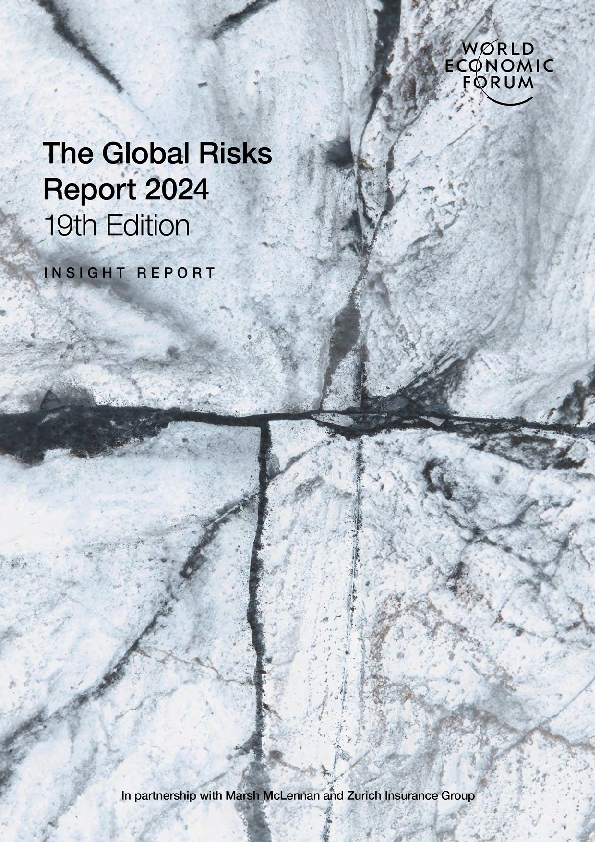 Read this article in French
Read this article in French- Share this article
- Subscribe to our newsletter
Global Risks Report 2024
Human development is slowly being chipped away, leaving states and individuals vulnerable to new and resurgent risks. This is the warning given in the World Economic Forum’s Global Risks Report 2024, published in January of this year. Against a backdrop of systemic shifts in global power dynamics, climate, technology and demographics, global risks are stretching the world’s adaptive capacity to its limit.
The report argues that cooperation on urgent global issues could be less forthcoming, requiring new approaches to risks. Two-thirds of global experts expect to see a multipolar or fragmented order taking shape over the next decade, in which middle and great powers contest and set – but also enforce – new rules and norms.
The report, produced in partnership with Zurich Insurance Group and Marsh McLennan, draws on the views of over 1,400 global risks experts, policymakers and industry leaders, who were surveyed in September 2023. The results give a predominantly negative outlook for the world in the short term that is expected to worsen over the long term. While 30 per cent of experts anticipate an increased chance of global catastrophes in the next two years, nearly two thirds expect this over the next 10 years.
Growing disinformation and conflict
The 2024 risks outlook was dominated by concerns over a persistent cost-of-living crisis and the intertwined risks of societal polarisation and AI-driven misinformation and disinformation. The nexus of falsified information and societal unrest will take centre stage amid elections in several major economies set to take place in the next two years. Interstate armed conflict is also a top five concern over the next two years. With several conflicts under way, underlying geopolitical tensions and corroding societal resilience increase the risk of conflict contagion.
Economic uncertainty and declining development
The coming years will be marked by persistent economic uncertainty and growing economic and technological divides. Lack of economic opportunity is ranked sixth for the next two years. Over the longer term, barriers to economic mobility could build, locking out large segments of the population from economic opportunities. Conflict-prone or climate-vulnerable countries may increasingly be isolated from investment, technologies and job creation. In the absence of pathways to safe and secure livelihoods, individuals may be more prone to crime, militarisation or radicalisation.
Planet in peril
Environmental risks continue to dominate the risks landscape over all timeframes – with an increasing possibility of passing a point of no return. Two-thirds of global experts are worried about extreme weather events in 2024. Extreme weather, critical change to Earth systems, biodiversity loss and ecosystem collapse, natural resource shortages and pollution represent five of the top 10 most severe risks identified for the next decade. However, experts disagreed on the urgency of risks posed – private sector respondents believe that most environmental risks will materialise over a longer timeframe than respondents from civil society or government.
Responding to risks
The report calls on leaders to rethink action to address global risks. It recommends focusing global cooperation on rapidly building guardrails for the most disruptive emerging risks, such as agreements on the use of AI in conflict decision-making. However, the report also explores other types of action that need not be dependent on cross-border cooperation. These include shoring up individual and state resilience through digital literacy campaigns on misinformation and disinformation. Another recommendation is increased research and development on climate modelling and technologies in order to speed up the energy transition. Both the public and private sectors can play a role in this.
(WEF/ile)
Read more and download the report on the WEF website





Add a comment
Comments :